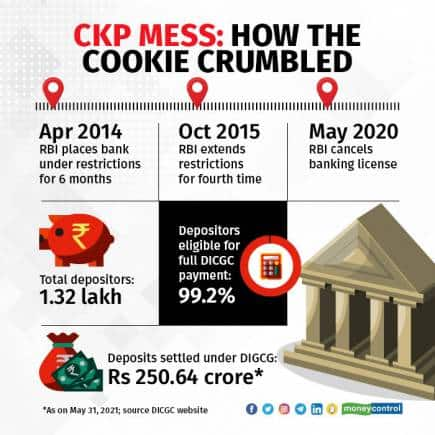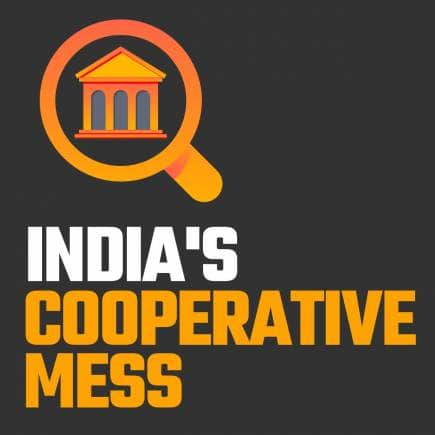



In May 2020, Mumbai-based PR Toraskar’s world fell apart. India was just over a month into the COVID lockdown when his television screen flashed: “RBI cancels CKP Cooperative Bank’s banking licence.” The 65-year-old, a retired, handicapped lecturer, was shattered. Toraskar’s family of six—his wife, two children and aged parents—all held accounts with CKP. Till date, they are yet to get back more than Rs 15 lakh of their savings.
He tried to reach out to the bank multiple times, but was met with clueless bank officials who only asked him to wait for some more time.
“Four months ago, I had to undergo a leg surgery and that led to multiple complications due to gangrene. I had to spend Rs 3-3.5 lakh for this surgery,” Toraskar told Moneycontrol. “With the bulk of my money stuck at the bank, it was an uphill task to pay for this medical emergency. The bank collapsed, but what about depositors?”
Toraskar’s 92-year-old father had a paralysis attack, while he himself is confined to a wheelchair. The family had parked a major part of their life’s savings in CKP, eyeing a higher interest rate on fixed deposits.
“Twenty years back, CKP gave me 1 percent extra interest rate on my fixed deposit, compared to other banks. Hence, I was tempted,” said Toraskar. “Now that I look back, it feels that in the greed for 1 percent, my entire life took a turn for the worst.”
Aggrieved depositors
Toraskar is not the only one.
Following the cancellation of the bank’s licence, Reserve Bank of India (RBI) spokesperson Yogesh Dayal, had tweeted on May 3, 2020, that out of 1,32,170 depositors of the bank, about 99.2 percent would get full payment of their deposits from the Deposit Insurance and Credit Guarantee Corporation (DICGC). According to the DICGC, claims worth Rs 250.64 crore for 43,720 depositors were settled under the deposit insurance claim of traceable depositors till May 2021.

While the DICGC cover has helped to cover the majority of depositors, others with deposits above the Rs 5 lakh cap are still waiting for their money. Typically, the timeframe to get back deposits is long and the wait is uncertain.
Take, for instance, 47-year-old Mahesh Sathe, a working professional from Mumbai, who had about Rs 20-25 lakh in the bank right from the 1990s. After the bank was liquidated in 2020 and after getting his insured amount, Sathe’s savings of around Rs 12-15 lakh are still stuck in the bank.
“The lockdown phase was the worst. My mother was hospitalised, and my savings were stuck. I was totally helpless,” Sathe said. “There is just one CKP branch operating in Mumbai’s Dadar area, while most others have shut down. Till date, I have to go there asking for my deposit claims only to be met with a rude, harsh response from bank officials. There is no information passed down; there is zero visibility on the claim status or the timeline.”
Not just that, CKP depositors are also having to carry the additional financial burden of fighting a legal battle in the Supreme Court challenging the regulator’s liquidation order.
The CKP Bank case
Troubles at CKP had been brewing for many years before the regulator cancelled its licence. In April 2014, the RBI had imposed restrictions on CKP’s deposit and advance operations. This was largely because CKP’s financial position had worsened beyond redemption. The bank had built its business around borrowers in the real estate sector and when some of these big-ticket loans turned sticky, the bank got into trouble.
Bad loans had spiked significantly and the timeframe given by the central bank to work out a credible revival plan had expired.
On May 2, 2020, the RBI cancelled the Mumbai-based cooperative bank’s licence stating that the bank’s financial position was “highly adverse and unsustainable.” Public interest would be adversely affected if the bank is allowed to carry on its banking business any further, the RBI had said, noting that the bank was not in a position to pay its present and future depositors.
Why are depositors agitated?
In January 2017, the RBI permitted the bank to increase its share capital by converting some of the deposits above Rs 1 lakh. However, this conversion, subject to depositors consenting and meeting ‘know your customer’ and other guidelines, was seemingly not a success.
In a letter reviewed by Moneycontrol, the RBI asked the bank in October 2017 why it had not been able to increase its share capital through the conversion of deposits “as set out in the target”. CKP probably adopted this route to streamline its liabilities, strengthen its capital position and help in its revival. Comments sought from the RBI regarding this issue did not elicit a response till this story was published.
Both Toraskar and Sathe were among those depositors who had consented to convert part of their deposits into equity shares of the bank. But once the bank was liquidated, their equity share was wiped out too.
It was then that Vishwas Utagi, secretary of Bank Depositors Protection & Welfare Society (BDPWS) and a banking expert brought together around 800 depositors on a virtual platform to make their voices heard. Senior citizens, who were not well versed with technology, also joined the movement via video calls and virtual meetings. Finally, a few court cases were filed but the date kept getting extended. The Supreme Court is now set to hear the case next on September 12.
“It was more difficult for depositors because they could not even hold physical meetings, conduct protest agitations during the lockdown,” said Utagi. “Even the insurance amount from DICGC has hardly come on time.”

Problem of dual regulations
In India, cooperative banks are regulated by the RBI and the respective state governments, leading to the issue of dual regulations. Another key reason for the problem is the absence of corporate governance practices, proper audits and risk management structures in cooperative banks.
“The registrar of cooperative societies officials say that the RBI does not look closely at these banks, while the RBI says it waits for government recommendations to act as the state's cooperatives department has its auditors on the boards of the banks,” said Anshul Gupta, managing partner at ANG Partners Advocates & Solicitors.
According to Bharat Chugh, former judge and advocate at the Supreme Court, “naive unsuspecting customers” coupled with a total lack of proper audits and oversights by the regulators are the reasons behind failures of such banks.
“It’s a failure at multiple levels—regulators, auditors and directors,” said Chugh. “When things are looking good, these issues do not surface but when the financial tide is out, one gets to know what the real picture is.”
Experts said that if the withdrawals are capped by the regulator, there is little that the customer can do immediately. There is no provision to withdraw excess funds over and above the insurance cover in times of emergency. Hence, there needs to be some caution on behalf of depositors while depositing a bulk of their savings in one sole lender, they said.
“Depositors should note that though cooperative banks tend to provide higher interest rates as compared to private and normal public sector banks, these banks are regulated together by RBI and the state governments. Owing to this, problems relating to dual governance will always pose a risk to the stable functioning of these banks,” said Sanket Jain, partner at Pioneer Legal.
Hence, depositors should ensure that they do not put all their money in one bank account since any restrictions imposed by the RBI will make them lose their access to their respective funds. Customers should monitor key metrics such as bad loan ratio and return on assets, among others, and make an informed decision, Jain added.
(This is the third story in a Moneycontrol series on ‘India’s cooperative mess' that highlights the plight of retail depositors whose hard-earned savings are stuck at failed cooperative banks across the country. You can read the first part of the series here and the second part here.)
Discover the latest Business News, Sensex, and Nifty updates. Obtain Personal Finance insights, tax queries, and expert opinions on Moneycontrol or download the Moneycontrol App to stay updated!